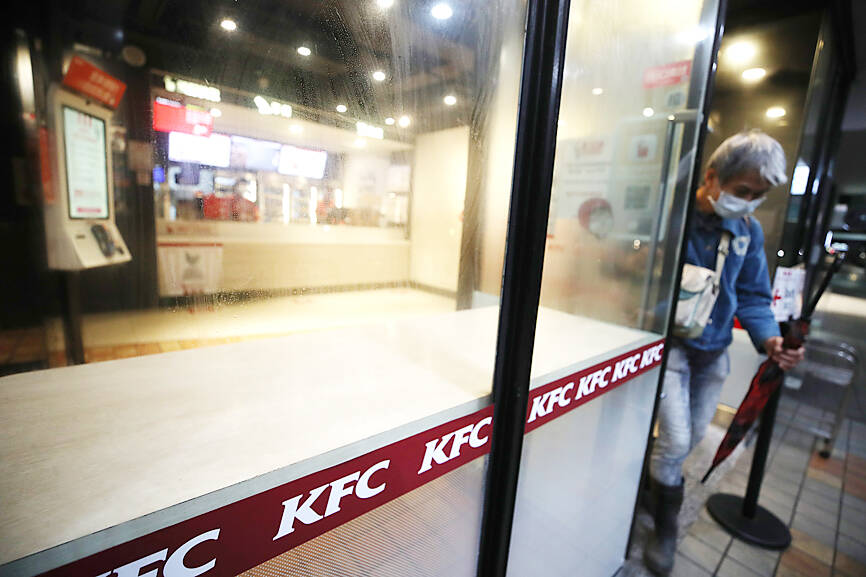US fast-food chain KFC is raising the prices of some of its items in Taiwan to reflect growing costs, the company said yesterday.
Starting today, prices would increase by an average of 6.2 percent, KFC said in a statement.
Prices increased by NT$6 for an egg tart, NT$6 for a piece of fried chicken, NT$4 to NT$7 for orders of French fries, NT$6 for a Zinger spicy chicken sandwich and NT$11 for a Peanut Lava Zinger, it said.

Photo: CNA
As for beverages, the price of a small hot Americano rose by NT$1 and the prices of milk tea, Coca-Cola and lemon iced tea increased by NT$3 to NT$5, it added.
KFC attributed the price hike to rising operating costs and issues affecting the global chicken supply chain.
It came after several other brands, including McDonald’s, Din Tai Fung (鼎泰豐) and Dain-Dain Hamburger (丹丹漢堡), announced plans to raise prices.
Meanwhile, convenience store chain Taiwan FamilyMart Co (全家便利商店) is to increase the price of tea eggs from NT$10 to NT$13 from Wednesday next week.
The price hike, the first for cooked eggs since 2015, reflects the continuously rising price of eggs, which has climbed nearly 40 percent over the past six months, FamilyMart said on Monday.
Tea eggs, which are eggs cooked in tea and soy sauce, are a popular and unique staple item at convenience stores across the nation.
A special promotion is to be held from Wednesday to Feb. 7, during which customers who pay an additional NT$1 for designated drinks would receive a free tea egg, or they can buy 10 tea eggs for NT$100 by using the FamilyMart app, it said.

RUN IT BACK: A succesful first project working with hyperscalers to design chips encouraged MediaTek to start a second project, aiming to hit stride in 2028 MediaTek Inc (聯發科), the world’s biggest smartphone chip supplier, yesterday said it is engaging a second hyperscaler to help design artificial intelligence (AI) accelerators used in data centers following a similar project expected to generate revenue streams soon. The first AI accelerator project is to bring in US$1 billion revenue next year and several billion US dollars more in 2027, MediaTek chief executive officer Rick Tsai (蔡力行) told a virtual investor conference yesterday. The second AI accelerator project is expected to contribute to revenue beginning in 2028, Tsai said. MediaTek yesterday raised its revenue forecast for the global AI accelerator used

TEMPORARY TRUCE: China has made concessions to ease rare earth trade controls, among others, while Washington holds fire on a 100% tariff on all Chinese goods China is effectively suspending implementation of additional export controls on rare earth metals and terminating investigations targeting US companies in the semiconductor supply chain, the White House announced. The White House on Saturday issued a fact sheet outlining some details of the trade pact agreed to earlier in the week by US President Donald Trump and Chinese President Xi Jinping (習近平) that aimed to ease tensions between the world’s two largest economies. Under the deal, China is to issue general licenses valid for exports of rare earths, gallium, germanium, antimony and graphite “for the benefit of US end users and their suppliers

Dutch chipmaker Nexperia BV’s China unit yesterday said that it had established sufficient inventories of finished goods and works-in-progress, and that its supply chain remained secure and stable after its parent halted wafer supplies. The Dutch company suspended supplies of wafers to its Chinese assembly plant a week ago, calling it “a direct consequence of the local management’s recent failure to comply with the agreed contractual payment terms,” Reuters reported on Friday last week. Its China unit called Nexperia’s suspension “unilateral” and “extremely irresponsible,” adding that the Dutch parent’s claim about contractual payment was “misleading and highly deceptive,” according to a statement

Artificial intelligence (AI) giant Nvidia Corp’s most advanced chips would be reserved for US companies and kept out of China and other countries, US President Donald Trump said. During an interview that aired on Sunday on CBS’ 60 Minutes program and in comments to reporters aboard Air Force One, Trump said only US customers should have access to the top-end Blackwell chips offered by Nvidia, the world’s most valuable company by market capitalization. “The most advanced, we will not let anybody have them other than the United States,” he told CBS, echoing remarks made earlier to reporters as he returned to Washington